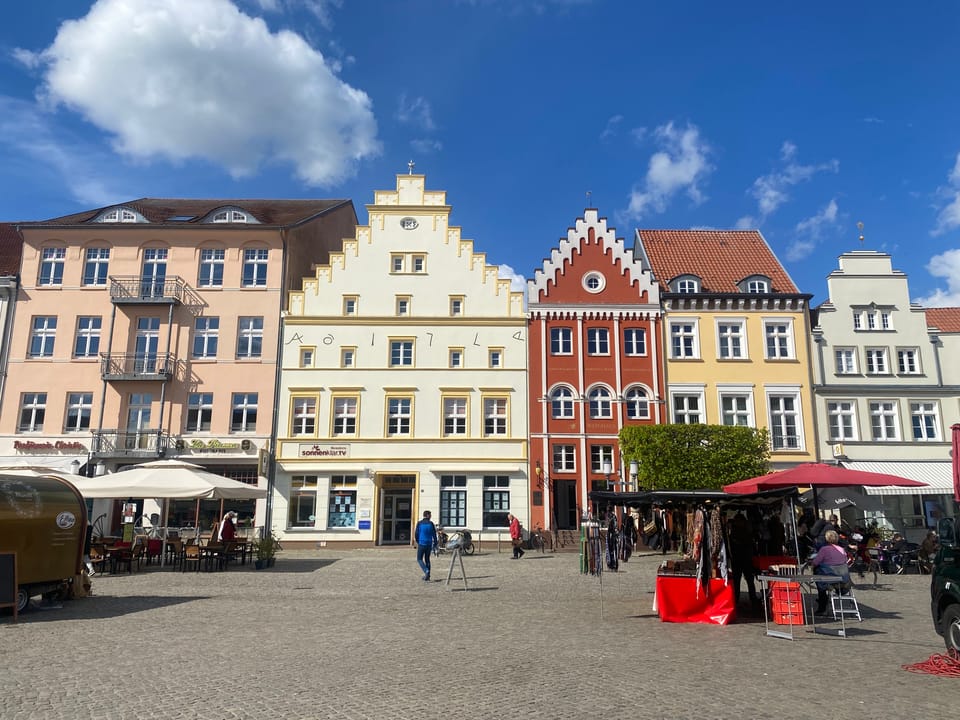How do you solve a problem like AfD? Or MAGA?

“The thing about AfD,” says Heide, “is that they are everywhere, giving people what they need.” She puts down her knife and fork with a sigh.
My partner Danny and I are in Greifswald, a small city on the Baltic coast in former East Germany. Tomorrow, he’ll be the featured guest at a colloquium at the university here. His host, Eckhard, a professor of German literature, has invited us to dinner with his wife and colleague, Heide.
Our conversation has covered Christian Kracht’s novels (Eckhard and Danny’s expertise) and cringe culture (Heide’s). Now, as the sun sets over the marina out the window and we near the bottom of our second glasses of wine, we’re on to politics. I lean forward. “What do you mean?”
Heide explains how the AfD—Alternative für Deutschland, the far-right party—makes itself highly visible in daily life in the state of Mecklenburg-Vorpommern, home to Greifswald: out in the community, tabling at festivals, handing out practical items like tape measures with the AfD logo on them. Although AfD came in second place overall in February’s federal elections, it was the undisputed victor in much of former East Germany, including here.
“People come to their booth and ask, you know, ‘Do you have more of these tape measures, these are great,’ and they say, ‘Oh, not now, but here is some information, and come back tomorrow, we will have more,’” Heide says. The other parties have tried to copy their tactics, but in many places, they don’t have enough volunteers. “Because it isn’t safe,” she explains. “You need at least four or six people to have a booth at a festival like that, because there are so many AfD supporters. It can be unsafe to publicly show that you’re with a different party.”
They have the money, but we have the people. The people are with us; we just need to get organized. These were the refrains when I was an organizer-in-training in the early 2010s, learning skills like street canvassing, building volunteers’ leadership, and running community meetings. The Supreme Court had just granted corporate money the human right to free speech in the 2010 Citizens United decision. The super PACs were swarming, corporate lobbying was intensifying, and the Tea Party was blossoming, but, we believed, if we could just reach people, they were still with us.
My new friends and I, thrown into the crucible of an intense organizing training program, would stay up late drinking cheap beer and discussing questions like, What happens when right-wing money starts copying our organizing strategies?
A couple of years later, I read about the Libre Initiative, a just-launched network to organize Hispanic communities in swing states. Libre was building an army of activists who did things like help undocumented immigrants navigate the DMV, run GED prep classes, and give out free Thanksgiving turkeys and Easter candy baskets—all while engaging them in political education.
Progressive groups have a history of blending this sort of community-rooted programming with political organizing, to great effect. The Black Panthers provided free breakfast for children ten years before Congress funded the school breakfast program. The “fraternal societies” or mutual aid organizations of the 19th century strengthened, and in some cases morphed into, the U.S. labor movement. As I wrote about in April, Die Linke, a leftist party in Germany, is doing this today, combining cultural and social events, counseling services, and political activism.
But Libre was different. And as I read about them, my stomach churned with a creeping dread.
Libre was launched by the infamous Koch brothers, the fossil fuel titans. In addition to their many other right-wing projects, they’ve invested millions of dollars a year in Libre since 2012 with the explicit objective of persuading Latine voters to support their brand of extreme libertarianism. It seems they’re succeeding: Trump won a historic share of Latino men’s vote in 2024—largely based on economic messaging. And they’re not slowing down.
For the last few months, I’ve been contemplating, intermittently but obsessively, the question: How do we win people back from the far right? It sounds academic, but it’s existential—and it certainly feels that way in my body, when I’m lying awake at 1 am and the comforter is too hot and my heart is thumping like I’m on a runaway train charging toward a cliff.
The corollary question, perhaps even more important, nags at me, too: What are we winning people back to?
The likes of AfD and Libre understand that we are living through a time of economic precarity and anxiety. It’s a time similar in many ways to 1912 America—circa the Titanic’s maiden voyage—when technology and the labor force were changing rapidly, a handful of men were getting extraordinarily rich while the rest were left behind, and the average worker’s power was weak.
Organizations like AfD and Libre skillfully exploit these conditions. They know that the sorts of social safety net services they’re offering are effective vehicles for their messages precisely because they give people what they need. And they’re happy to provide these services—when they’re in the minority, operating outside of government.
The cynical thing, of course, is that these people want to eliminate these exact kinds of services when the government provides them. Once they gain governing power, they’ll take it all away—except for those they deem worthy, and that gets dark.
Many of us know this, right? It’s deeply frustrating. It’s become almost mandatory among groups of liberals talking politics to sigh and shake our heads and tut about “people’s ignorance.” (And then we’re surprised when the right attacks our “liberal elitism.”)
But here’s what I remind myself late at night: Most people believe that government should make our lives better by fixing roads and bridges, delivering clean drinking water, and (even in the U.S.) providing at least some health care. Most people believe that corporations privatizing those same things to run them for profit is a bad idea. And most people believe that billionaires should pay their fair share in taxes so that government can do its job.
This is progressive economic populism. It’s also common sense. And it’s verifiably popular:
- A Fox News poll in 2019 found that 70% of the network’s own respondents supported Rep. Alexandria Ocasio-Cortez’s proposal to tax the rich (to the bafflement and chagrin of the Fox hosts reporting on the results—it’d be funny if it weren’t so gaslight-y).
- More recently: Just before the 2024 elections, the Center for Working-Class Politics tested three different types of messaging among working-class voters in Pennsylvania: Trump’s actual messages, Harris’ actual messages, and progressive populist messages. They found that the latter performed the best by a significant margin.
- Other studies—and this is crucial—have found that messaging grounded in progressive economic populism for all people is an effective counter to the right’s use of racism, transphobia, and xenophobia. In other words, Democratic politicians can (and seriously urgently need to) stop rushing to throw trans people, non-white people, immigrants, and Palestinians under the bus. That’s a whole other essay, but the point is that reclaiming the economic narrative doesn’t have to mean ceding ground on social issues.
A note: I don’t want to conflate the left, broadly speaking—by which I’m short-handing people across a spectrum of radical, progressive, and liberal views—and the Democratic Party. They’re not the same. But all of us who agonize over the questions that keep me up at night—whether a local radical abolitionist group or the national Democratic party or anything in between—are in at least adjacent lifeboats, navigating the same choppy seas. And so far, the Democrats’ attempts to row have been far from impressive.
To be clear: There are many problems facing the left, including AI’s muddling of reality, the rise of right-wing culture-shapers, and the siloed echo chambers of modern news media. But I keep coming back to this as a key starting point, or perhaps a prerequisite for addressing the rest: Reclaiming economic populism from the far right. And meaning it—making it real.
Because nailing the messaging is just step 1. Then comes action—first, in campaigning like AfD and Die Linke do, and second, in policy.
When the left gains governing power again—and some version of the left, represented imperfectly by the Democratic party, eventually will—they’ve got to implement these policies. Or to echo Heide’s words in Greifswald: they’ve got to be everywhere, giving people what they need. And it needs to happen fast, because this is where they’ve failed too many times. When they fail, they reinforce the right’s narrative that government doesn’t work and needs to be dismantled… and we circle right back around to where we are now.
Meanwhile, over here in the democratic socialist country of Germany, there’s no reason that the government can’t start implementing popular progressive policies that address the economic needs of AfD’s base, and take the wind right out of their sails. But, sadly, the new centrist government is unlikely to do it. And, not to get all womp womp, but it will be no surprise if their centrist deadlock fails, and the AfD winds up stronger than ever.
One of the lessons of the speed of the MAGA movement’s growth is that many, many people are persuadable. In 2008 and 2012 and 2018 and 2020, Democrats persuaded a lot of the U.S. to vote for them. But they’ve repeatedly failed to fulfill the fundamental promise of democratic society, which is that government can make everyone’s lives better—no exceptions. It’s no wonder that people are open to the fascist promise, that government can make your life better at the expense of someone else’s. It doesn’t mean the shift is permanent.
It may be hard to imagine a big blue Democrat booth handing out useful household items at county fairs in Alabama. It’s not so hard to imagine progressive groups around the country doing similar work—and indeed many are doing this quite skillfully at the local level. We need both.
If I squint a little farther into the distance, I can picture a, say, Department of Economic Advancement booth, under the hot sun of a county fair, giving out rebate coupons for high-efficiency household appliances (induction ranges? heat pumps? solar arrays?), perhaps with a government logo and President Ocasio-Cortez’s signature on them. Let’s start to imagine this—or whatever your version of it is. Even more important, let’s start making it happen.
And how do we make that happen? Take a page from the AfD playbook and the Koch playbook—which are themselves blurry photocopies of a decades-old, successful progressive playbook: organize.
Then again, perhaps I’m naive. Perhaps it’s a flight of fancy to think that the wave of right-wing nationalism can be stopped; perhaps it’s true that, as a dear writer friend put it in conversation a few months ago, “history is one long string of dark ages punctuated by brief periods of enlightenment.” But what troubles me is that these arguments lead us to despair as the only outcome, and that they seem to rest upon basic assumptions about human nature—that most people are irredeemable, that we are fundamentally selfish, that we are too stupid for persuasion. The right’s organizing proves this untrue, and the left’s has, too.
So let’s get to it.
Love,
Ari
What else?
- Re: big bad budget bill, everyone’s talking about Medicaid, SNAP, and tips. The ever-cogent Bill McKibben offers up compelling analysis from a climate and energy perspective.
- On the flip side, the recent Australian elections were a welcome great news for progressive economic populism and the climate.
- Closer to home, a big win against Trump dismantling the Dept. of Education. (Go Somerville School Committee, go!)
- Apropos of nothing, as we say goodbye to the penny, a delightful deep dive into the coin’s history.

Member discussion